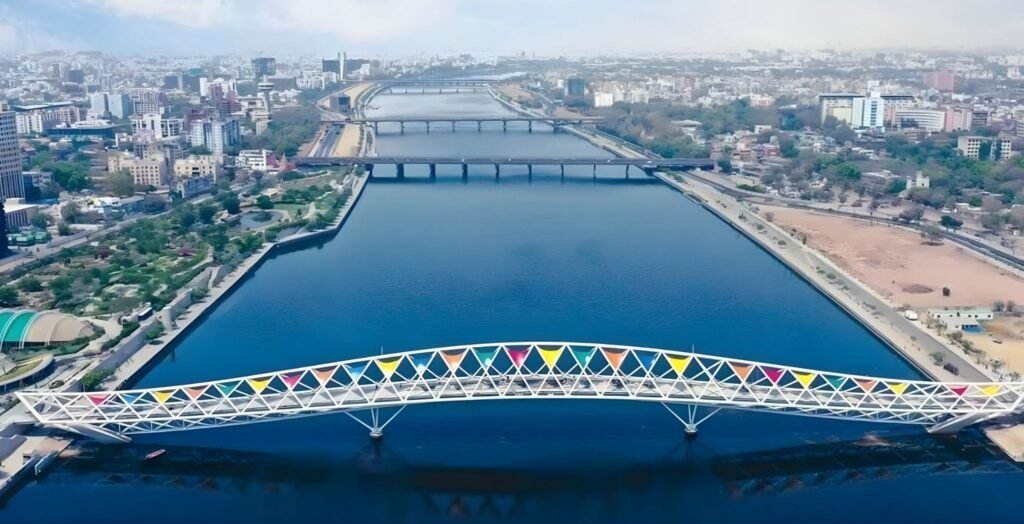Welcome to the marvel of engineering prowess – the Atal Bridge, a groundbreaking infrastructure project poised to redefine connectivity and enhance transportation networks.
Set to become an emblem of progress and innovation, the Bridge stands first in the nation, poised to seamlessly link the western and eastern sections of the illustrious Sabarmati Riverfront.
Inspired by a vision for modernity and efficiency, the Bridge represents a culmination of meticulous planning and cutting-edge design to streamline travel and foster socio-economic growth.
With its strategic location and robust construction, this Bridge promises to alleviate congestion, facilitate smoother commutes, and catalyze urban development.
The Bridge is not only a testament to human ingenuity but also honors the legacy of its namesake, reflecting resilience, progress, and unwavering commitment to advancement.
As a symbol of connectivity and progress, the Bridge heralds a new era of infrastructural excellence, poised to leave an indelible mark on the landscape and the hearts of those it serves.
1. Architectural Design
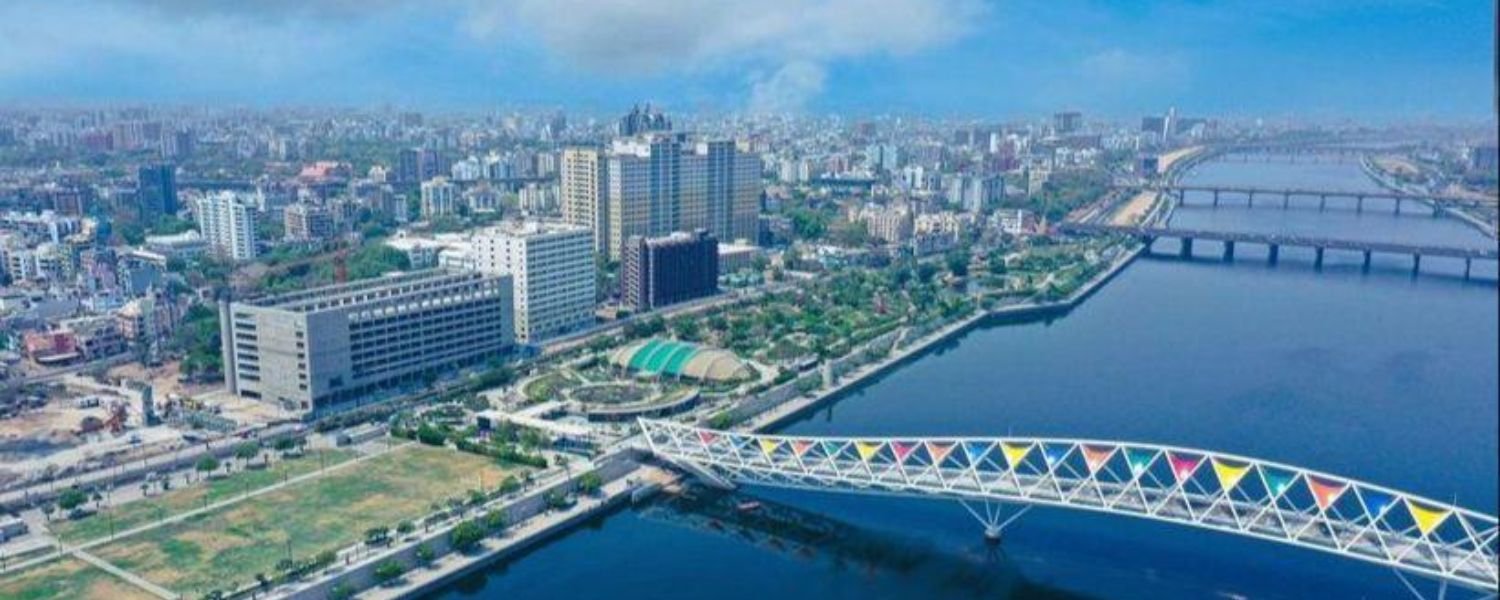
The architectural marvel known as the Atal Bridge stands as a testament to ingenuity/innovation.
Inaugurated in 2022, this Bridge seamlessly blends functionality with aesthetics, boasting a design inspired by the graceful flight of kites.
Stretching across 300 meters in length and spanning a width of 10 to 14 meters, the Bridge isn’t just a means of connectivity but a work of art in its own right.
Its unique architectural design, reminiscent of soaring kites against the backdrop of the sky, captures the imagination of all who behold it.
The Bridge’s construction not only serves the practical purpose of facilitating transportation but also adds to the region’s cultural tapestry.
Its fluid lines and dynamic form pay homage to the heritage and traditions of the area while also embracing modern engineering principles.
As visitors traverse its expanse, they are transported from one point to another and on a journey through the intersection of tradition and innovation.
The Bridge is the mark of progress, unity, and the enduring spirit of human creativity, inviting all to marvel at its beauty and ponder the limitless possibilities of architectural design.
2. Historical Significance of Atal Bridge
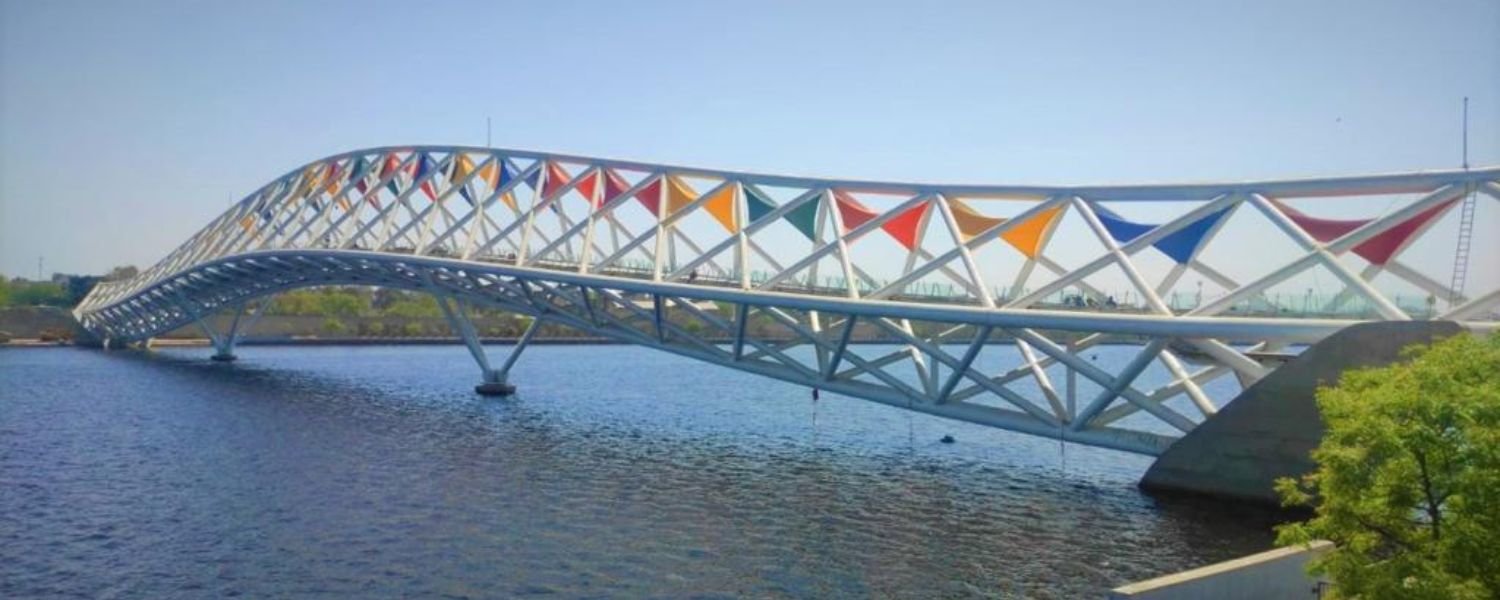
The Bridge is a testament to both architectural prowess and historical significance in the vibrant cityscape of Ahmedabad.
This iconic structure serves as more than just a means of crossing the river; it symbolizes bridging physical and symbolic divides.
By connecting the eastern core of the city with the more developed western region, the Bridge has fostered a sense of equilibrium and balance in urban planning, promoting accessibility and connectivity for residents and visitors alike.
Moreover, the Bridge holds a special place in people’s hearts as it celebrates the importance of pedestrians, providing a safe passage for foot travelers amidst the hustle and bustle of city life.
Beyond its practical function, the Bridge has become a beloved landmark, drawing locals and visitors from across the state and country.
Its serene location amidst the riverine nature offers an escape where one can unwind and soak in the beauty of the surroundings.
The Bridge is not only a mere physical construction but also represents the essence of togetherness, development, and admiration for the natural world.
Its historical significance transcends its architectural marvel, making it a cherished asset to the cultural landscape of Ahmedabad and beyond.
3. Impact of Atal Bridge on Local Transportation
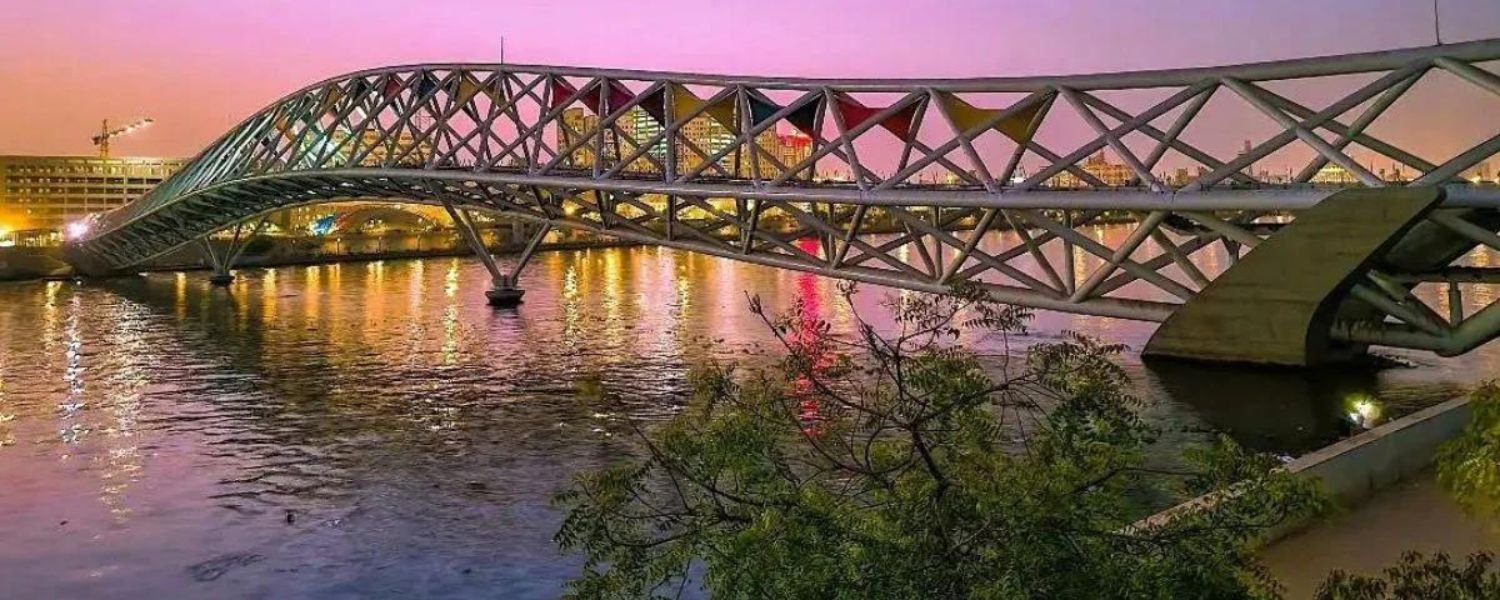
The Bridge, formally known as the Atal Bihari Vajpayee Sewari-Nhava Sheva Atal Setu or the Mumbai Trans Harbour Link, is a monumental feat in local transportation infrastructure.
This marvel, constructed at a significant cost of Rs 17,840 crore, represents a vital link between central Mumbai and the burgeoning Navi Mumbai.
Its impact on local transportation is nothing short of transformative.
Commuters can rejoice in the dramatically reduced travel time with the Bridge in operation.
What once took a laborious 2-hour journey can now be traversed in a mere 20 minutes, revolutionizing the accessibility between these two vital areas.
This remarkable connectivity enhancement saves precious time and fuels economic growth by facilitating the swift movement of goods and people.
Moreover, the Bridge alleviates congestion on existing routes, easing the burden on the local transportation network and enhancing overall efficiency.
Its strategic location catalyzes urban development, unlocking new opportunities for businesses and residents alike in both central Mumbai and Navi Mumbai.
4. Engineering Challenges in Constructing Atal Bridge

Constructing the Bridge posed several engineering challenges that required innovative solutions.
One significant hurdle was integrating electronic toll collection (ETC) technology seamlessly into the Bridge’s infrastructure.
ETC facilitates automatic toll collection from vehicles, streamlining traffic flow and reducing congestion.
This contemporary system enhances efficiency and convenience for commuters.
Moreover, ensuring earthquake resistance was paramount due to the region’s seismic activity.
To address this concern, engineers implemented base isolation bearings as shock absorbers.
These bearings are specially designed to absorb seismic forces, enhancing the Bridge’s earthquake resilience.
The Bridge is a testament to modern engineering prowess and safety standards by incorporating such advanced techniques.
Despite the complexities, the Bridge’s construction showcases the engineering team’s ingenuity and expertise.
By overcoming toll collection technology integration challenges and earthquake resilience, the Bridge now serves as a transportation link, promoting connectivity and facilitating smoother travel experiences for all.
5. Economic Benefits of Atal Bridge

The Bridge, a crucial infrastructure marvel, catalyzes economic prosperity.
Its strategic positioning and robust design contribute significantly to fostering economic growth in the region.
By facilitating smoother logistics operations, the Bridge emerges as a pivotal asset, streamlining the movement of goods and services.
This enhanced connectivity reduces transportation costs and slashes delivery times, thereby increasing efficiency and productivity for businesses.
Moreover, the Bridge is a magnet for investments, attracting domestic and international stakeholders keen on tapping into the burgeoning opportunities within the region.
The increased accessibility provided by the Bridge opens up new avenues for trade and commerce, stimulating economic activity and fostering entrepreneurial ventures.
Consequently, this influx of investment capital fuels job creation, providing livelihood opportunities for the local populace and bolstering their socio-economic well-being.
Furthermore, the Bridge serves as a symbol of progress and development, elevating the overall economic landscape of the area.
Its presence enhances connectivity and signifies a commitment to infrastructural advancement, instilling confidence among investors and stakeholders.
As trade activities flourish and businesses thrive, the economic benefits of the Bridge reverberate across sectors; we aim to promote lasting growth and prosperity in the area.
This will be achieved by paving the way for development. We strive to provide the necessary support to ensure a stable economy that benefits everyone.
6. Cultural Importance of Atal Bridge
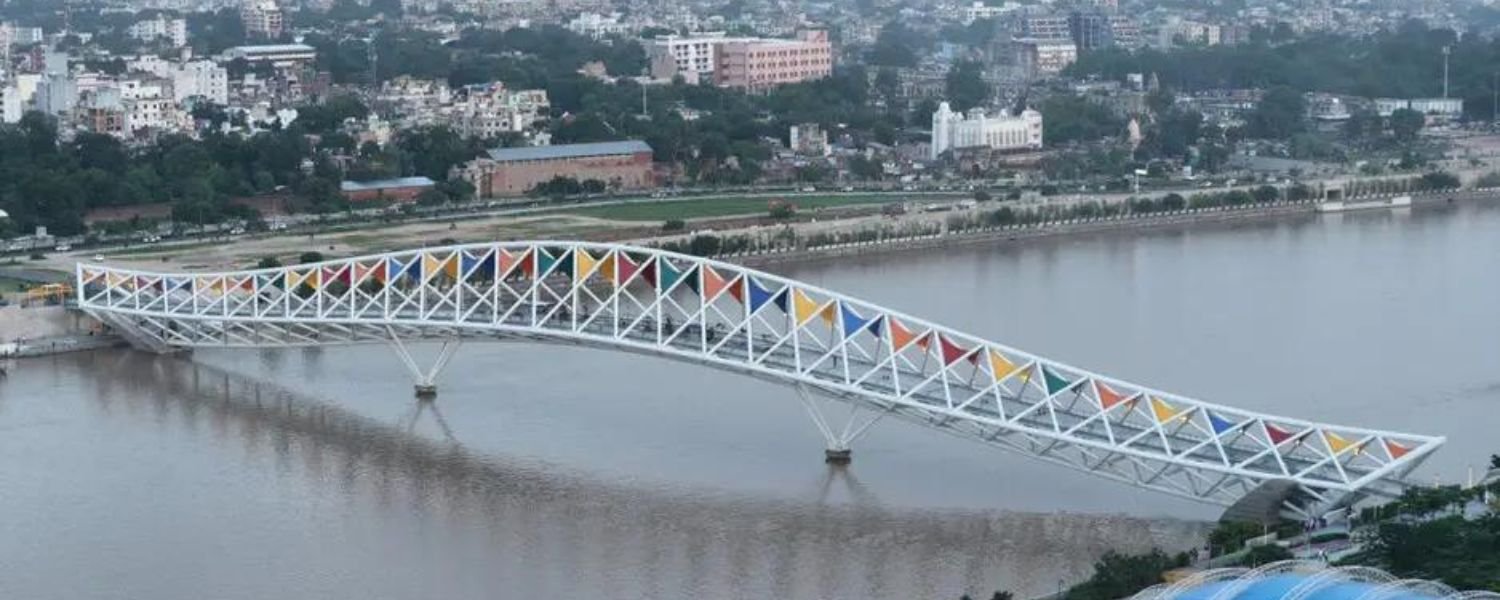
The Aal Bridge in Ahmedabad is more than just a structure; it symbolizes the cultural significance of pedestrian connectivity.
Nestled amidst the serene riverine surroundings, this iconic Bridge has become a beloved destination not only for the residents of Ahmedabad but also for people from across the state and country.
Its architectural brilliance and engineering prowess have elevated both the status of the riverfront and the city itself.
The Bridge celebrates the essence of pedestrian movement, providing a space where people can stroll, gather, and enjoy the natural beauty surrounding it.
Visitors flock to this marvel to unwind, socialize, and appreciate the tranquil ambiance it offers.
Beyond facilitating transportation, the Bridge is a cultural landmark, symbolizing unity and connectivity.
It has become integral to the city’s identity, reflecting the harmony between urban development and environmental conservation.
In essence, the Bridge is not just a pathway; it’s a testament to the ingenuity of human endeavor and a beacon of cultural pride for Ahmedabad and beyond.
Its significance transcends mere infrastructure, embodying the spirit of community and reverence for nature.
7. Environmental Impact Assessment of Atal Bridge
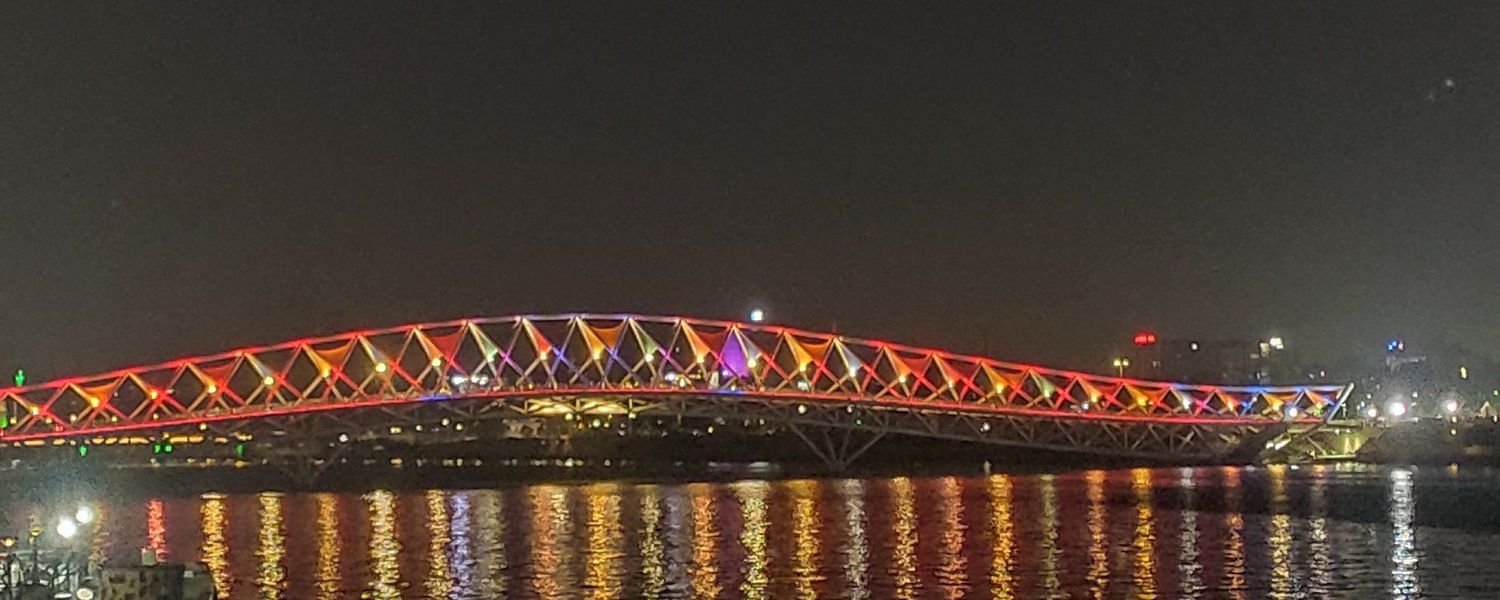
The Atal Bridge, a pivotal infrastructure project, has sparked discussions surrounding its Environmental Impact Assessment (EIA).
The EIA of the Bridge delves into the repercussions of rapid construction on the environment, urging a reconsideration of infrastructure planning strategies.
The construction of the Bridge has not been without its ecological consequences.
The EIA identifies various negative impacts, including habitat disruption, alteration of water flows, and air and noise pollution due to construction activities.
Additionally, the Bridge’s development has raised concerns about local communities’ displacement and biodiversity loss in the surrounding areas.
To mitigate these adverse effects, the EIA recommends implementing sustainable construction practices, such as using eco-friendly materials, minimizing disturbance to wildlife habitats, and employing measures to reduce pollution.
Moreover, it underscores the importance of engaging with local societies and indigenous peoples in planning and decision-making processes to address their concerns and livelihoods.
8. Tourist Attractions Near Atal Bridge
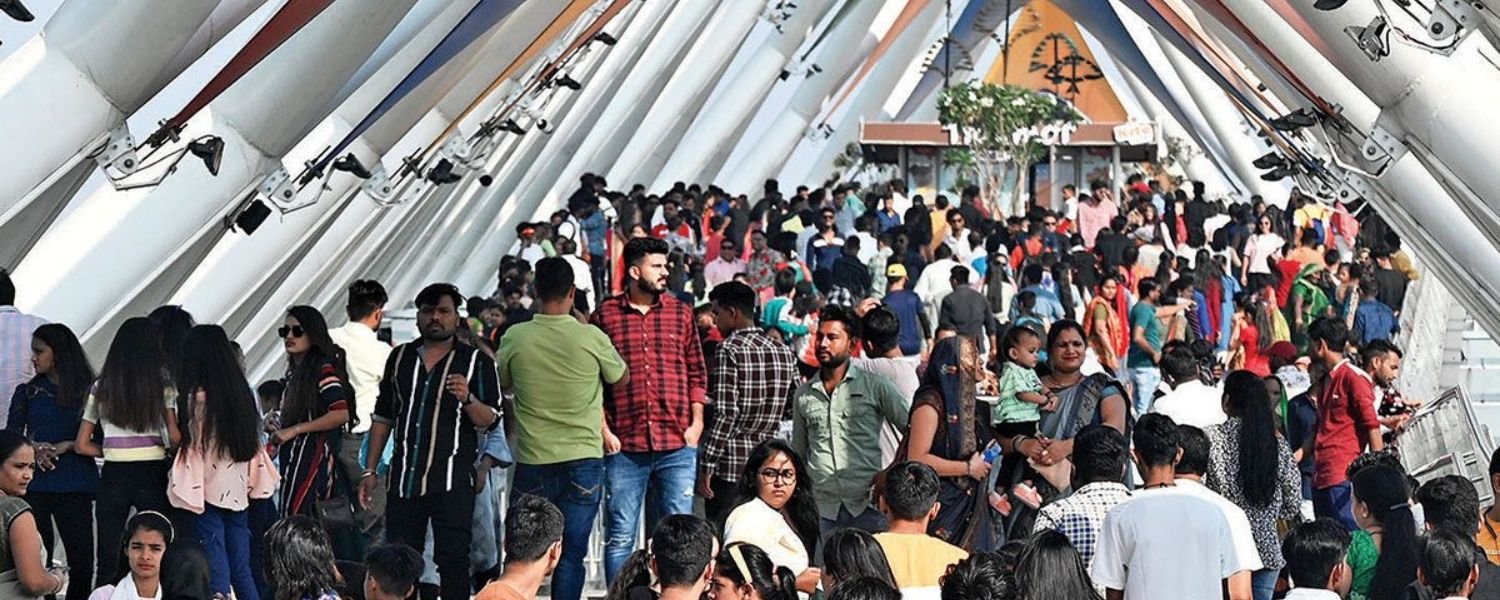
Ahmedabad’s scenic Sabarmati Riverfront, where the majestic Atal Pedestrian Bridge stands, symbolizes architectural brilliance and cultural inspiration.
Spanning the Sabarmati River with a length of 300 meters and a width ranging from 10 to 14 meters, this triangular truss bridge is a testament to modern engineering fused with traditional aesthetics, drawing inspiration from the graceful flight of kites that adorn the Gujarat skies.
Inaugurated in 2022, the Atal Pedestrian Bridge offers more than just a convenient crossing; it provides visitors with a fantastic view of the Sabarmati River and the surrounding cityscape.
As you traverse its pathways, you’ll find yourself immersed in the vibrant atmosphere of Ahmedabad, with bustling markets, quaint cafes, and cultural landmarks dotting the landscape nearby.
Exploring the attractions near Bridge unveils a treasure trove of experiences.
From the tranquil Sabarmati Riverfront Park, ideal for strolls and picnics, to the iconic Sabarmati Ashram, where Mahatma Gandhi’s legacy echoes through time, there’s something for every traveler’s taste.
Additionally, visitors can indulge in the vibrant street food scene, savoring local delicacies like dhokla and fafda, or delve into the city’s rich heritage by exploring heritage sites such as the Sidi Saiyyed Mosque and the intricately carved Adalaj Stepwell.
9. Maintenance and Upkeep of Atal Bridge
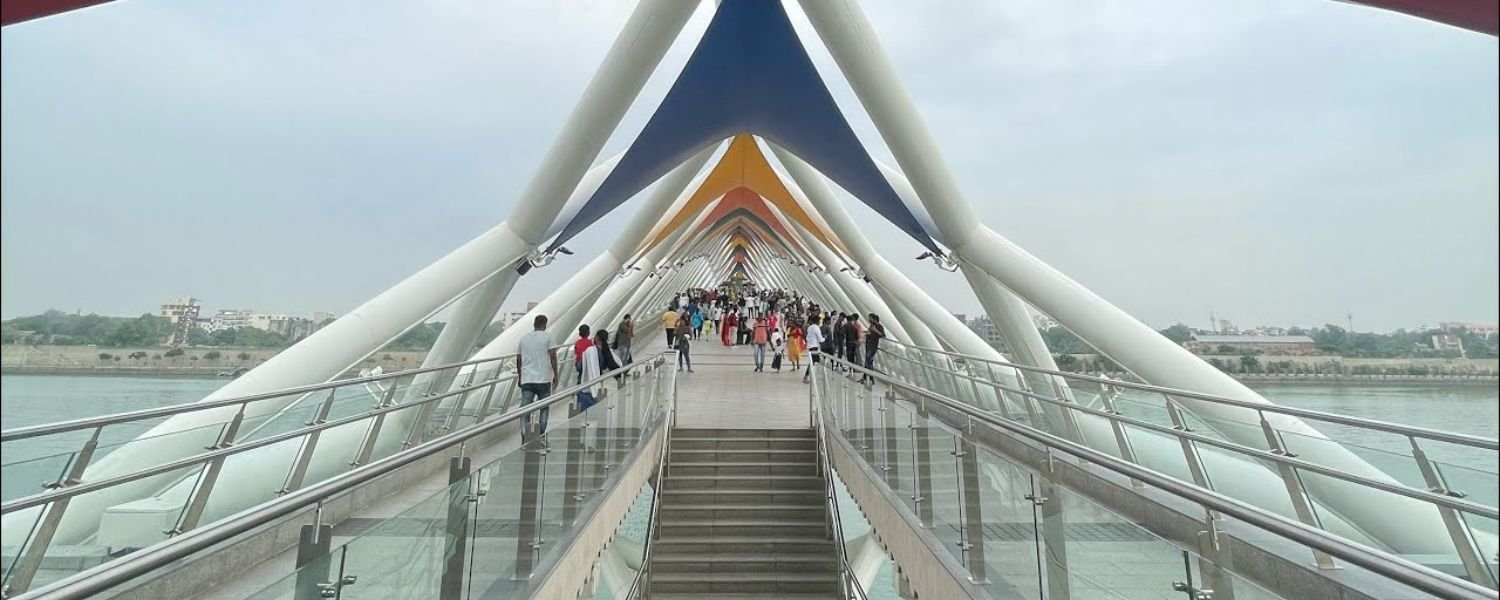
Maintaining the Bridge, a vital link between Genda Circle and Manisha Chowkdi is a top priority for the Vadodara Municipal Corporation (VMC).
To ensure the longevity and safety of this crucial infrastructure, the VMC has initiated a comprehensive maintenance program.
Central to this effort is applying liquid seal coating on the Bridge’s road surface.
Liquid seal coating is a specialized technique designed to protect the road surface from wear and tear caused by regular use, weather elements, and other environmental factors.
By applying this coating, the VMC aims to enhance the durability of the Bridge’s road, preventing cracks, potholes, and other forms of damage.
This proactive maintenance approach improves the overall quality of the driving experience and reduces the need for frequent repairs, ultimately saving time and resources.
Regular upkeep of the Bridge is essential to ensure the safety and convenience of commuters who rely on this route for their daily travels.
Through initiatives like liquid seal coating, the VMC demonstrates its commitment to providing reliable infrastructure that supports the community’s mobility needs.
By investing in preventive maintenance measures, the VMC not only preserves the integrity of the Bridge but also contributes to the long-term development and prosperity of the region.
10. Future Development Plans Around Atal Bridge
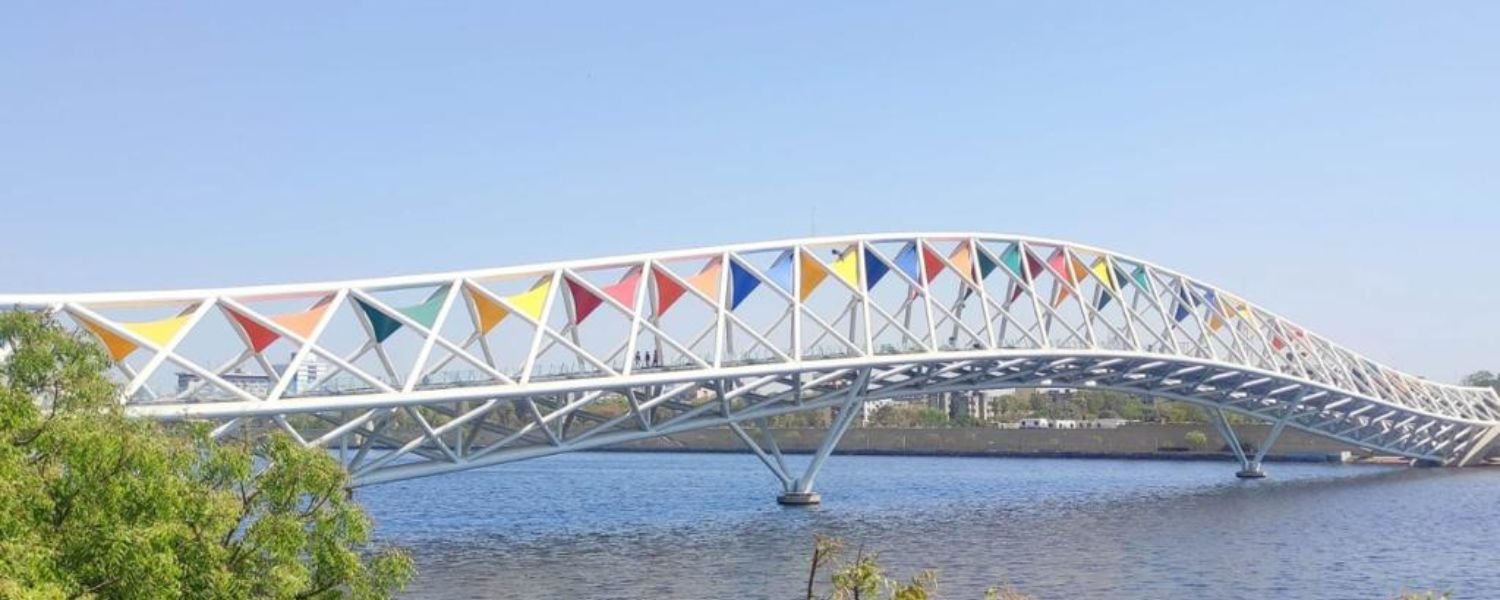
In the realm of infrastructure development, the plans around the Bridge are set to usher in significant enhancements.
Situated as a vital artery connecting two regions, these development blueprints aim to bolster connectivity and ensure safer passage for commuters.
The Bridge, named in honor of the late Indian Prime Minister Atal Bihari Vajpayee, symbolizes progress and unity.
Under the proposed developments, critical aspects such as structural reinforcement, expansion, and modernization take precedence.
Engineers and planners focus on reinforcing the Bridge’s structural integrity to withstand increased traffic demands and natural elements.
Additionally, plans include widening lanes to accommodate burgeoning traffic volumes, thus alleviating congestion issues and enhancing the overall transportation flow.
Furthermore, modernization efforts are underway to incorporate state-of-the-art technologies for improved monitoring, maintenance, and safety measures.
Implementing intelligent sensors and monitoring systems will enable real-time assessment of the Bridge’s condition, ensuring proactive maintenance and minimizing risks.
These future development plans around the Bridge underscore a commitment to fostering seamless connectivity, promoting economic growth, and prioritizing commuter safety.
By leveraging innovation and strategic planning, stakeholders aim to elevate the Bridge’s functionality and longevity, catering to the evolving needs of the populace and facilitating smoother transitions between regions.
Conclusion
In conclusion, the Atal Bridge is a testament to engineering prowess, connecting two points on a map and bridging communities, economies, and aspirations.
Its robust structure facilitates smoother transportation and symbolizes the unyielding spirit of progress and connectivity.
Named after the visionary leader Atal Bihari Vajpayee, it carries forward his infrastructural development and nation-building legacy.
As a crucial link in the transportation network, the Bridge reduces travel time and enhances accessibility to remote regions, unlocking their economic potential and fostering social integration.
Its significance extends beyond mere concrete and steel, representing a beacon of hope and advancement for the areas it serves.
In essence, the Bridge epitomizes the transformative power of infrastructure in shaping the trajectory of a nation.
It stands tall, not just as a physical structure, but as a symbol of connectivity, progress, and unity, embodying the ethos of a rapidly evolving India.
For more News-related blogs, Subscribe to us Now!
FAQ
Q1. What is the Atal Bridge?
A. The Bridge is a prominent infrastructure project named after the late Indian Prime Minister, Atal Bihari Vajpayee.
It stands as a testament to his vision for connectivity and progress.
Q2. Where is the Atal Bridge located?
A. The Bridge spans majestically across the connecting vital regions and facilitates smoother transportation and economic growth and development.
Q3. What makes the Atal Bridge unique?
A. Designed with state-of-the-art engineering, the Bridge ensures efficient travel and prioritizes safety and durability, promising decades of service to the communities it serves.
Q4. How does the Atal Bridge impact the region?
A. The Bridge significantly enhances accessibility, opening up trade, tourism, and socio-economic development opportunities.
Its completion marks a milestone in the region’s infrastructure development journey.
Q5. Who oversaw the construction of the Atal Bridge?
A. The construction of the Bridge was meticulously managed by skilled engineers and dedicated laborers under the guidance of, ensuring adherence to the highest standards of quality/craftsmanship.
Q6. When was the Atal Bridge inaugurated?
A. The Bridge was inaugurated on, marking a momentous occasion for the region and its inhabitants.
